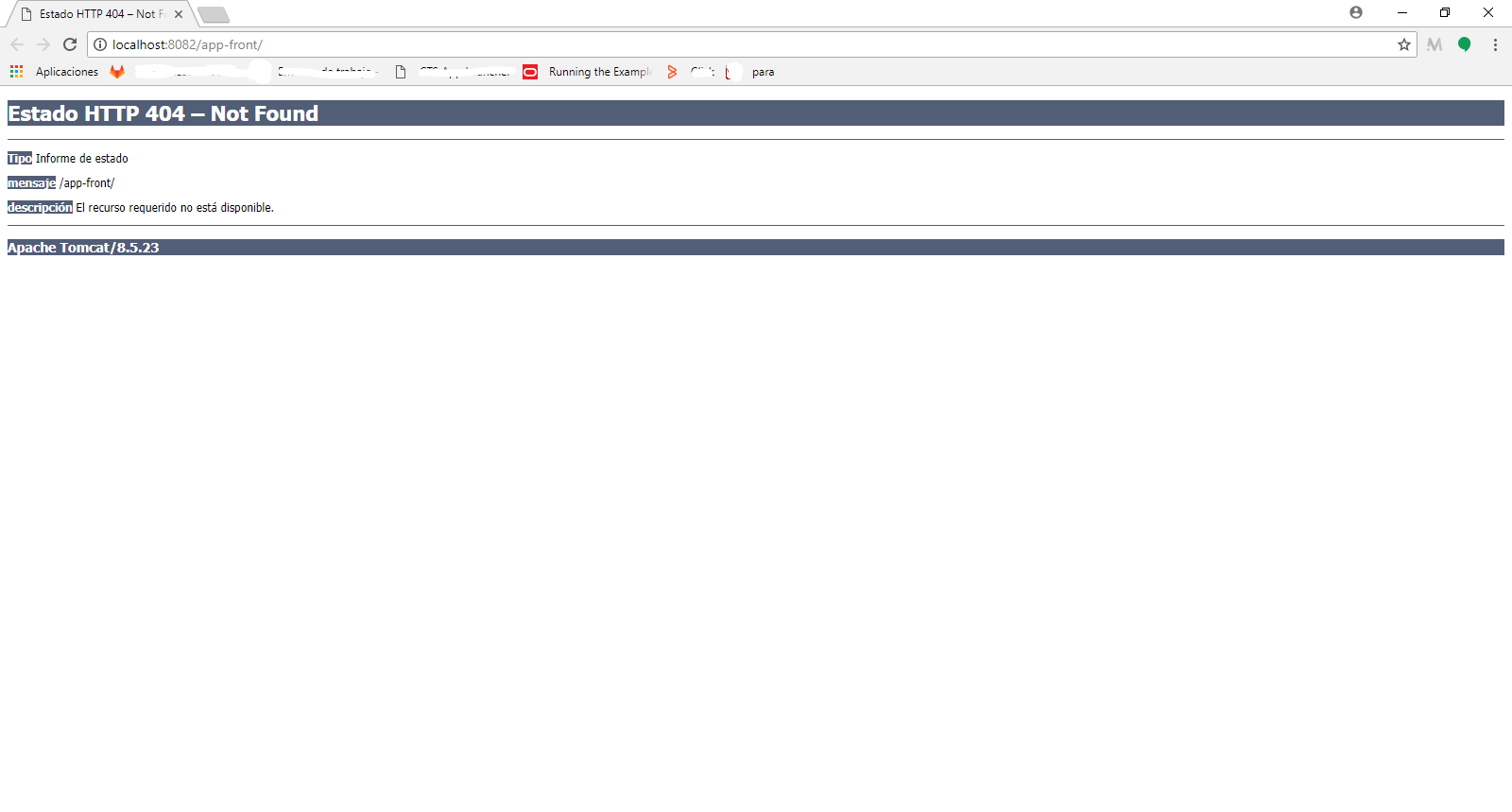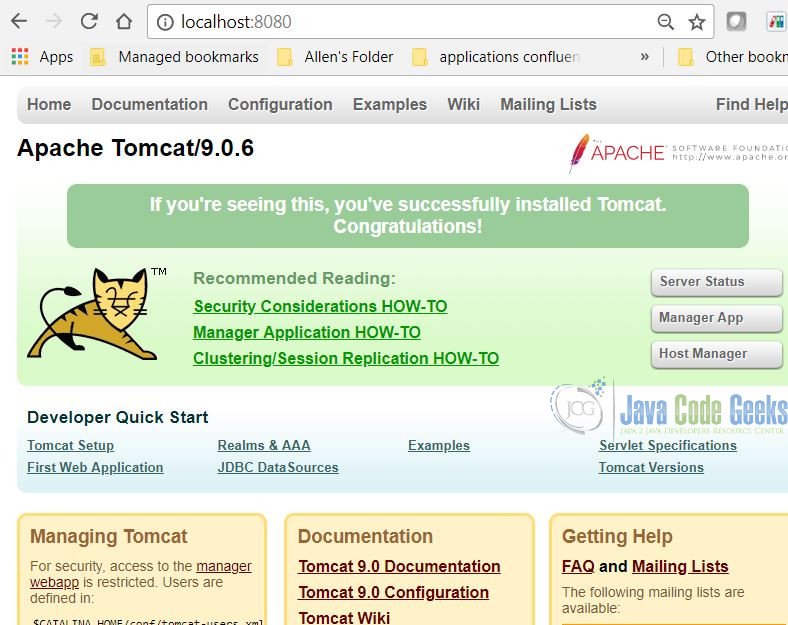- Http Status 404 Tomcat Docker
- Tomcat Http 404
- Http 404 Tomcat Free
- Http 404 Apache Tomcat
- Http 404 Error Tomcat
Today I was running Apache Tomcat from Eclipse and while accessing URL http://localhost:8080 found HTTP Status 404 – Not Found error.
The origin server did not find a current representation for the target resource or is not willing to disclose that one exists.
Do you have any of below questions?
The HTTP Server header can be changed by changing the 'server-info' string value. The 'server-info' string value can be set by adding '-D' parameters to the conf MailExpressServerService.conf file. Look for the wrapper.java.additional section. To use the Tomcat 'server-info,' add -Dgsb.info.type=tomcat (the default is -Dgsb.info.type=me). How are websites accessed?; Web development; In order to access a web page in a browser, you just have to enter the URL into the address bar in your web browser and the requested website will pop up on your screen. I have a server which I flip back and forth between tomcat 6 and tomcat 8. When I do an HTTP post using the command curl -v -X POST -d @webOpenCnsRealCheatsheet.xml -H Referrer:mobileWMS,LLC -H C. HTTP Status 404 Tomcat Apache. Ask Question Asked 7 years, 4 months ago. Active 4 years, 6 months ago. Viewed 59k times 7. I'm going to be honest, never used this before, I'm simply trying to install it correctly. I'm running windows 7 and I have jre 6 and 7. I go to system properties, environment variables and enter in a new system variable. The tomcat top page is opening so jasperreport server is running but it is unable to open any pages.( e.g: index.htm or login.html) inside it. Arindam.dan - 6 years 9 months ago Have you tried opening up the Tomcat Manager?
- Tomcat starts but doesn’t display webpage
- Can’t connect to Tomcat even though it’s running
- How to Solve Common Tomcat Problems
- Can’t connect to localhost via browser. Can ping localhost
- How to open tomcat home page in browser
- localhost 8080 not working for tomcat
For all above types of issues, you are at right place.
I’ve setup Apache Tomcat by following detailed steps using in-depth tutorial.
Steps worked perfectly fine but as I didn’t have any projects added to tomcat webapps folder it threw 404 error for me.
If you also face 404 Page not found error then try following below steps:
Step-1
- Go to Eclipse IDE
- Click on
ServersTab - Double click on
Tomcat v9.0 Server at localhost
Step-2
- New Apache Tomcat configuration page will open
- Go to
Server Locationsection - Select
Use Tomcat installation(takes control of Tomcat installation)
Step-3
- Save configuration
RestartServer by right clicking on tomcat server and clickRestart- Visit
http://localhost:8080again and now you should see working tomcat page
I hope this tutorial works well for you. Happy coding and keep visiting.
Http Status 404 Tomcat Docker
This tutorial works for Apache Tomcat 10.0 too.
Join the Discussion
If you liked this article, then please share it on social media. Still have any questions about an article, leave us a comment.

Other Popular Articles...
Introduction
Oracle REST Data Services (ORDS) maps HTTP(S) verbs (GET, POST, PUT, DELETE, etc.) to database transactions and returns any results formatted using JSON.
If you want to use the web container (such as: Tomcat or Glassfish) as the listener for the Oracle Apex, you have to deploy the ORDS.war application to it.
404 Not Found has been a ccommon problem after we install the ORDS to a web container.
The article proposes a procedure the trouble shooting the 404 Not Found problem.
The deployment for the Oracle Apex in our case is shown in the following:
Procedure
Step Check the Oracle DB listener.

Make sure the listener working properly.
Login to Oracle user in the Oracle DB Server. Use the following command to show the listener status:
Step Check the RESTFul Service of the Apex in the Oracle DB
You should have the following three accounts for the RESTFul Service in the Oracle DB:
- APEX_PUBLIC_USER
- APEX_LISTENER
- APEX_REST_PUBLIC_USER
Connect to the Oracle DB and use the following SQL statement to check these users.
If you don’t have the three users, run the scrip @apex_rest_config.sql in the Apex install directory.
Step Check ORDS configurations.
Make sure the DB user ORDS_PUBLIC_USER exist in the Oracle DB.
If not, you have to reinstall the ORDS.
Login to the ORDS_NODE server (where you install the ORDS service), run the following commands:
The installation process will use the sys account to connect to the Oracle DB server and then install the required schema (Oracle REST Data Services) and create the ORDS_PUBLIC_USER user.
After completing the installation, we can validate it by running the command:
Tomcat Http 404
The logs of the installation and validation will be generated at /usr/share/ords/logs.
Step Check the status of the accounts used by the ORDS to connects to Oracle DB.
Http 404 Tomcat Free
Four accounts have been created:
- APEX_PUBLIC_USER
- APEX_LISTENER
- APEX_REST_PUBLIC_USER
- ORDS_PUBLIC_USER
Make sure the four accounts do not be locked and with expired passwords in the Oracle DB.
Login as sys to the Oracle DB, run the following statement to check:
Step Check the passwords of the previous accounts for the ORDS application.
ORDS application will use the four accounts to connect to Oracle DB. The passwords of the four accounts are stored at the configuration directory you have specified by the configdir parameter for ords.war. For example, run the following command in the ORDS_NODE server:
specify the configuration directory at usr/share/ords/conf/ords/conf.
In this configuration directory, you can see four xml files:
Http 404 Apache Tomcat
These xml files stores the names and passwords for the four accounts. Make sure the these accounts are consistent with those in the Oracle DB.
Http 404 Error Tomcat
If the password is inconsistent, the Tomcat cannot create the connection pool for the account for connecting to Oracle DB.You can find the error message in the Tomcat log. See How to Update the ORDS_PUBLIC_USER Password | ThatJeffSmith for more details.
